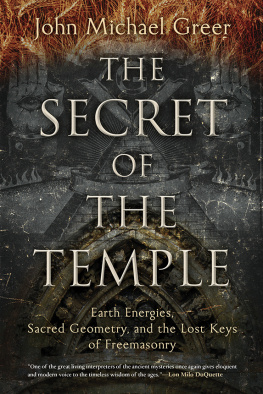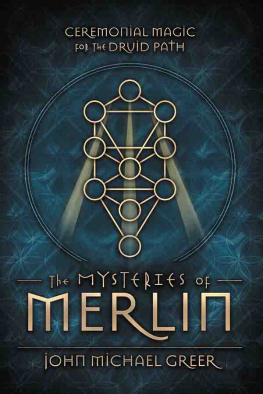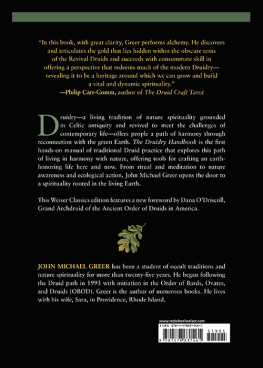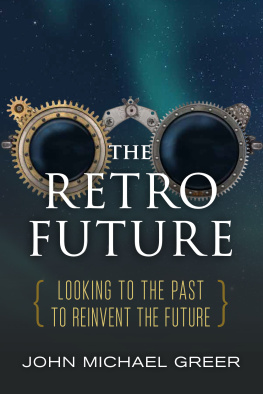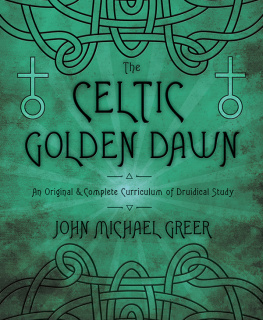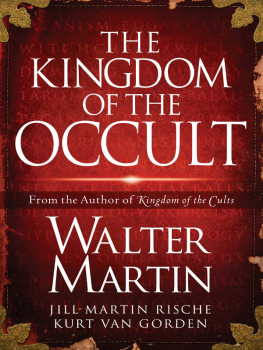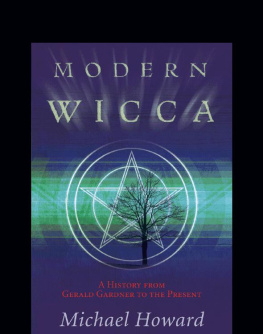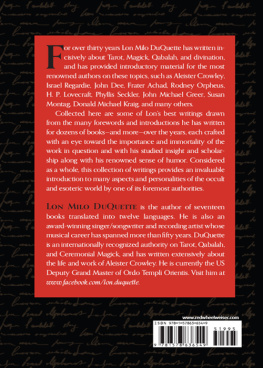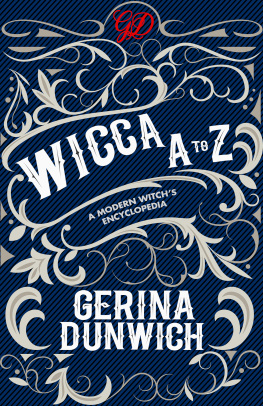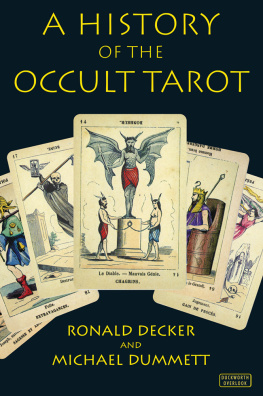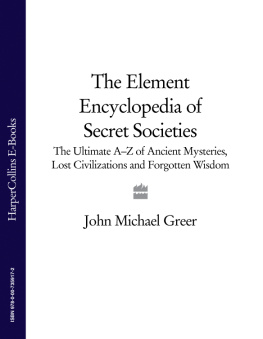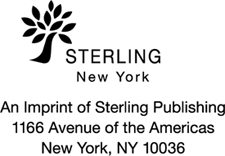STERLING and the distinctive Sterling logo are registered trademarks of Sterling Publishing Co., Inc.
All rights reserved. No part of this publication may be reproduced,
stored in a retrieval system, or transmitted in any form or by any means
(including electronic, mechanical, photocopying, recording, or otherwise)
without prior written permission from the publisher.
For information about custom editions, special sales, and premium and corporate purchases,
please contact Sterling Special Sales at 8008055489 or .
The world is not prepared yet to understand the philosophy of Occult Scienceslet them assure themselves first of all that there are beings in an invisible world, whether Spirits of the dead or Elementals; and that there are hidden powers in man, which are capable of making a God of him on earth.
H. P. Blavatsky (18311891)
INTRODUCTION
The gates of the Mysteries stand ever ajar, and those who will may pass through into the spacious domicile of spirit.
Manly P. Hall, The Secret Teachings of All Ages
In most of the worlds cultures and through most of the worlds history, the things that people in the modern Western world consider occultamulets and talismans, omens and divinations, spells and charms, spirits good and evilare simply part of everyday life. If you go to a Shinto shrine in Japan, for example, or to a temple of one of the traditional religions of West Africa, you can count on seeing things done there that would qualify as occultism in Europe or America. In these societies, nothing sets those things apart from any other body of traditional knowledge. People engage in them all the time without ever suspecting that they are doing something secret, forbidden, or irrational.
In the Western world, for complicated historical reasons, this hasnt been the case. Instead, starting in Roman times and accelerating with the triumph of Christianity, what we know as the occult was set apart as forbidden lore. From the first stirrings of antioccult hysteria through the horrors of the Burning Times, when hundreds of thousands of people were tortured and executed on suspicion of practicing magic, tremendous social pressures backed by the threat of violence fell on anyone who took an interest in the occultyet the occult traditions of the Western world managed to survive all that, finding new practitioners in every generation. That astonishing story of suppression, survival, and rebirth extending over more than two and a half millennia is the subject of this book.
The word occult literally means hidden, and its application to what we now call the occult has a long history. During the Renaissance, writers who wanted to refer to magic, divination, and the alternative spirituality connected with them began to use the term occult philosophythat is, hidden philosophyfor those subjects. That habit became permanent when Cornelius Agrippa titled his great textbook of Renaissance magic Three Books of Occult Philosophy. Later, during the revival of magic in the nineteenth century, French authors started using the word occultismein English, occultismfor the same subjects.
It can be useful to think of occultism as the rejected knowledge of the Western world. Every society has some body of knowledge that has been condemned by the intellectual authorities of the time but still is studied and taught outside the normal channels of education and public opinion. In industrial nations today, the explosive growth of knowledge has been matched by an equally explosive growth in rejected knowledge, and much of this has nothing to do with occultism. Still, the occult remains the oldest and the most savagely persecuted of all the Western worlds bodies of rejected knowledge.
Among the core elements of occultism are these:
Magicthe science and art of causing changes in consciousness at will, according to its great twentieth-century practitioner Dion Fortune. The mage, or practitioner of magic, uses rituals, symbolism, meditation, and other methods to enter into unusual states of consciousness in which, according to occult teachings, subtle powers can be directed and disembodied entities contacted to cause changes in the world.
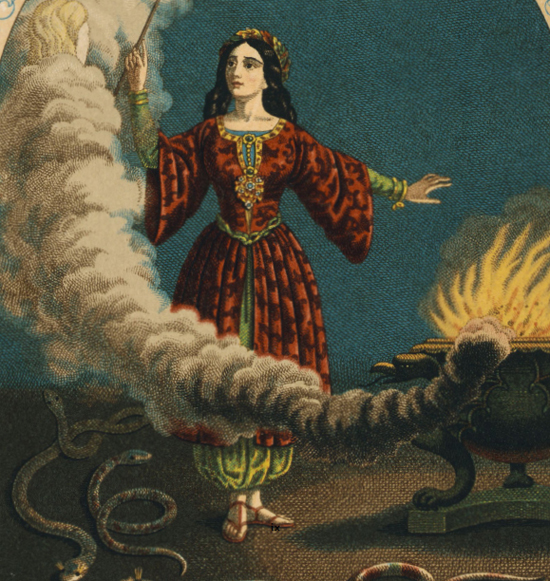
Patent medicine label, c. 1892, depicting a witch at her cauldron surrounded by beasts.
Divinationmore commonly known as fortune-telling, this is the art of knowing hidden things in the present and the secrets of the future through the same subtle links that in occult tradition make magic work. The Tarot card reader who shuffles and deals cards, the astrologer who studies the positions of the planets at a particular moment, and diviners using other methods all try to tap into the flow of unseen forces that will allow them to glimpse the unknown.
Initiationthe process by which an ordinary person develops the powers and abilities needed to master magic and divination. There are many methods of initiation, but the most famous are elaborate ceremonies that enact symbolic dramas, catalyzing changes in the consciousness of the new initiate. The mystery rituals of ancient Greece were famous initiations in their time; more recently, the rituals of magical lodges such as the Hermetic Order of the Golden Dawn and the Martinist Order serve the same function.
Alchemyoften dismissed by modern scientists as a failed attempt to turn lead into gold, alchemy is far more diverseand far more practical. To an alchemist, every material substance has a potential for perfection, and the methods of alchemy are used to help each substance achieve its perfection. Alchemists thus prepare herbal medicines, practice spiritual meditation, and work with a dizzying array of substances in their pursuit of hidden knowledge.
Occult philosophyunderlying these occult practices is a philosophy that explains how and why occultism works. Three main schools of occult philosophy have played a predominant role in the history of occultism. Neoplatonism, an offshoot of the philosophy of Plato, emerged in ancient Greece; Hermeticism, a blend of Greek philosophy and Egyptian magical teaching, had its start in Egypt; and Cabala (also spelled Kabbalah and Qabalah), the most recent of the three, was born in the Jewish communities of southern France. All three have strong similarities with one another and draw on many of the same sources.
Magic is the traditional science of the secrets of nature, which has come down to us from the mages.
liphas Lvi, Doctrine and Ritual of High Magic, 1855



